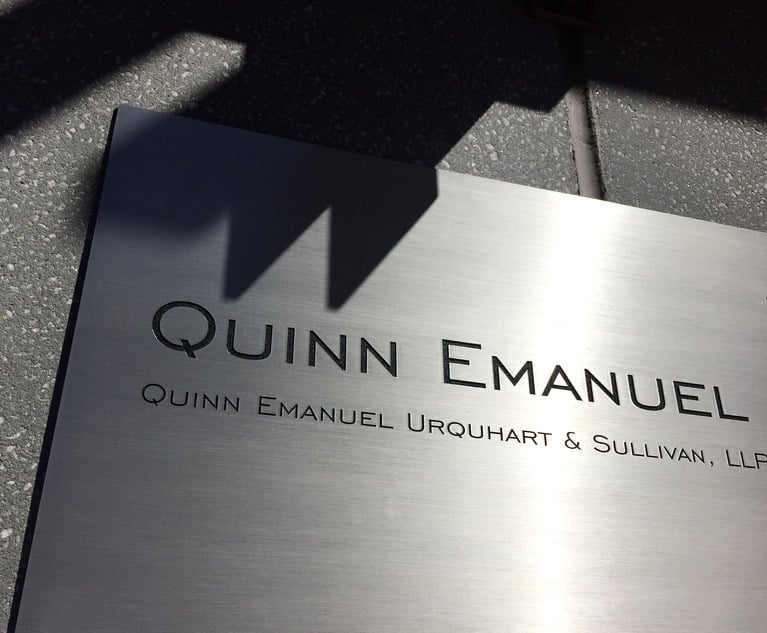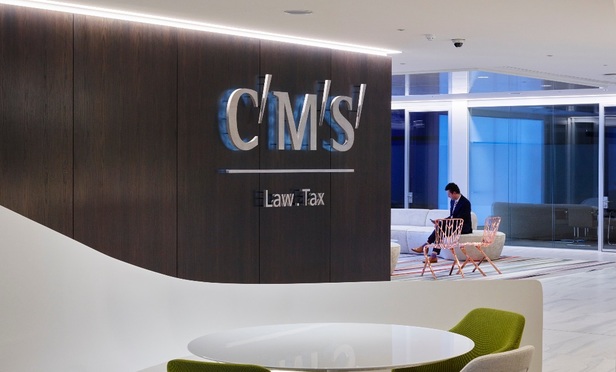CMS makes legal services and tech push with dedicated innovation team launch
New group to help join up the legal services and tech offerings of legacy firms.
September 14, 2018 at 08:56 AM
2 minute read
CMS has launched a new team responsible for joining up and advancing the firm's legal services and technology offerings, in a drive to consolidate the ambitions of the three legacy firms that merged last year.
The team, called CMS by design, is led by CMS executive partner Paul Stevens, and also consists of the firm's head of legal service design and delivery John Craske, head of tech innovation Jane Challoner, IT head Razvan Cretu, head of digital and data Elle Todd and client management head Jo Witham. They will report on progress to both senior partner Penelope Warne and managing partner Stephen Millar.
The group will help shape delivery of CMS's legal services and technology, as well as its four client services. These include Instinctive Understanding, its initiative for in-house lawyers; digital upskilling service Digital Academy; legal tech hub Developers on Demand; and Mix, which provides bespoke tech services to clients.
"Part of the rationale behind the merger was to invest time, energy and resource to develop better ways of serving clients through tech, processes and new approaches," said CMS executive partner, Paul Stevens, who was one of the architects behind the merger. "It's holistic, and aimed to embrace all elements of the client's needs."
The team will sit inside the firm's wider global tech and innovation group and work alongside an advisory team made up of lawyers from CMS's key sector groups, as well as business service specialists, external advisers and clients.
Stevens highlighted some of the projects that the legacy firms had embarked on, including Olswang's startup incubator equIP, and CMS Cameron McKenna's agile systems of working and use of Surface Pros.
"Since the merger, we've managed to leverage more resource into these initatives, and have grown equIP into a 65-business-strong programme," Stevens added. "It's doing well and we're rolling it out internationally.
"The three [legacy] firms had new technologies, which together could deliver more bang for your buck," he added. "On the merger, the idea was to be a future-facing firm. Now having gone through it, there will always be hiccups, but there were an awful lot of good things – this is the fruition of that."
This content has been archived. It is available through our partners, LexisNexis® and Bloomberg Law.
To view this content, please continue to their sites.
Not a Lexis Subscriber?
Subscribe Now
Not a Bloomberg Law Subscriber?
Subscribe Now
NOT FOR REPRINT
© 2025 ALM Global, LLC, All Rights Reserved. Request academic re-use from www.copyright.com. All other uses, submit a request to [email protected]. For more information visit Asset & Logo Licensing.
You Might Like
View All
X Ordered to Release Data by German Court Amid Election Interference Concerns

Compliance With the EU's AI Act Lags Behind as First Provisions Take Effect

Quinn Emanuel's Hamburg Managing Partner and Four-Lawyer Team Jump to Willkie Farr

Trump ICC Sanctions Condemned as ‘Brazen Attack’ on International Law
Trending Stories
- 1ACC CLO Survey Waves Warning Flags for Boards
- 2States Accuse Trump of Thwarting Court's Funding Restoration Order
- 3Microsoft Becomes Latest Tech Company to Face Claims of Stealing Marketing Commissions From Influencers
- 4Coral Gables Attorney Busted for Stalking Lawyer
- 5Trump's DOJ Delays Releasing Jan. 6 FBI Agents List Under Consent Order
Who Got The Work
J. Brugh Lower of Gibbons has entered an appearance for industrial equipment supplier Devco Corporation in a pending trademark infringement lawsuit. The suit, accusing the defendant of selling knock-off Graco products, was filed Dec. 18 in New Jersey District Court by Rivkin Radler on behalf of Graco Inc. and Graco Minnesota. The case, assigned to U.S. District Judge Zahid N. Quraishi, is 3:24-cv-11294, Graco Inc. et al v. Devco Corporation.
Who Got The Work
Rebecca Maller-Stein and Kent A. Yalowitz of Arnold & Porter Kaye Scholer have entered their appearances for Hanaco Venture Capital and its executives, Lior Prosor and David Frankel, in a pending securities lawsuit. The action, filed on Dec. 24 in New York Southern District Court by Zell, Aron & Co. on behalf of Goldeneye Advisors, accuses the defendants of negligently and fraudulently managing the plaintiff's $1 million investment. The case, assigned to U.S. District Judge Vernon S. Broderick, is 1:24-cv-09918, Goldeneye Advisors, LLC v. Hanaco Venture Capital, Ltd. et al.
Who Got The Work
Attorneys from A&O Shearman has stepped in as defense counsel for Toronto-Dominion Bank and other defendants in a pending securities class action. The suit, filed Dec. 11 in New York Southern District Court by Bleichmar Fonti & Auld, accuses the defendants of concealing the bank's 'pervasive' deficiencies in regards to its compliance with the Bank Secrecy Act and the quality of its anti-money laundering controls. The case, assigned to U.S. District Judge Arun Subramanian, is 1:24-cv-09445, Gonzalez v. The Toronto-Dominion Bank et al.
Who Got The Work
Crown Castle International, a Pennsylvania company providing shared communications infrastructure, has turned to Luke D. Wolf of Gordon Rees Scully Mansukhani to fend off a pending breach-of-contract lawsuit. The court action, filed Nov. 25 in Michigan Eastern District Court by Hooper Hathaway PC on behalf of The Town Residences LLC, accuses Crown Castle of failing to transfer approximately $30,000 in utility payments from T-Mobile in breach of a roof-top lease and assignment agreement. The case, assigned to U.S. District Judge Susan K. Declercq, is 2:24-cv-13131, The Town Residences LLC v. T-Mobile US, Inc. et al.
Who Got The Work
Wilfred P. Coronato and Daniel M. Schwartz of McCarter & English have stepped in as defense counsel to Electrolux Home Products Inc. in a pending product liability lawsuit. The court action, filed Nov. 26 in New York Eastern District Court by Poulos Lopiccolo PC and Nagel Rice LLP on behalf of David Stern, alleges that the defendant's refrigerators’ drawers and shelving repeatedly break and fall apart within months after purchase. The case, assigned to U.S. District Judge Joan M. Azrack, is 2:24-cv-08204, Stern v. Electrolux Home Products, Inc.
Featured Firms
Law Offices of Gary Martin Hays & Associates, P.C.
(470) 294-1674
Law Offices of Mark E. Salomone
(857) 444-6468
Smith & Hassler
(713) 739-1250









